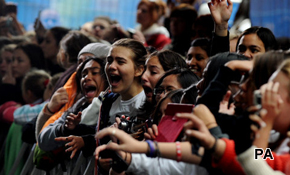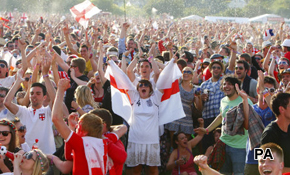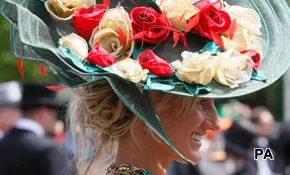What do you think about the famous 'British reserve'? Do you think the 'stiff upper lip' still exists, or has it disappeared in recent times?
Some people think of Britain as the nation of the “stiff upper lip”, meaning we are reserved, unemotional, or find it hard to show our feelings, especially in public. Social commentators often point to the death of Princess Diana as the turning point for the British reserve, suggesting that the outpouring of public grief indicated a new-found ability to display our emotions.
However, according to historian Dr Thomas Dixon, currently researching a project into the history of crying, the British actually have a long history of very public outpourings of grief - and our reputation for being emotionally reserved is actually a fairly new thing.

What do you think about this ‘stiff upper lip’?
Was it ever a trait of the British, or has it evolved over the years?
Is ‘reservedness’ something we, as Brits, are we guilty of?
The majority of you thought that British people used to be more reserved, but have changed in recent years - although opinion was divided as to whether this was seen as a positive change or not!
Other participants argued that, comparatively speaking, the stiff upper lip mentality remains, especially when looking at European or American culture, while some of you argued that the whole idea of ‘British reserve’ is a myth, unrepresentative of the population as a whole.

What's your view on the British ‘stiff upper lip’? Join the debate in the comment box below

Here's what our poll participants had to say...
What do you think about the ‘stiff upper lip’?
Argument 1: People in Britain used to be reserved, but no longer
“Many forms of media and education over the past half century have eroded the myth that showing feelings is somehow a negative thing or even a sign of  weakness. People today are encouraged to show their feelings” Anon
weakness. People today are encouraged to show their feelings” Anon
“Over the last 20 years we have learnt how to communicate and technology encourages us to do so” Anon
“We have taken on some traits of other cultures, especially American” Tez, Merseyside
“Changes in schooling & discipline have made people less formal” Anon
“The older generation are quite reserved and distant but the younger generation are more open and emotional” Anon
“There is a constant stream of over the top emotional outpourings at all sorts of events from national tragedies to reality TV shows. The idea of the "reserved" British is a myth now” Anon
“In schools I think there is more emphasis on self-esteem and expressing yourself than there used to be” Anon
“People are encouraged to air private problems, issues in public, including on TV and in magazines” Lesley, London
Argument 2: People in Britain today find it hard to show their feelings
“Compared to Americans or Europeans, the Brits find it hard to complain in case it causes offence” Anon
“In our Americanised media, showing feelings and emotions is commonplace and encouraged; but in real life, this seems to be looked down upon- like it's a sign of weakness” Anon
“Accounts from Europeans show that we are still relatively reserved” Anon
“In the US I have been pleasantly surprised at how personable relationships can be with clients, peers and colleagues. I always felt I had to hide who I was as a person in professional settings in UK” Anon
“I travel a lot in my job & I find most people very reserved. They do not like to strike up conversations with "strangers"; they only offer the minimum of help to get you out of their hair & rarely smile” Anon
“The only emotion they do feel all comes out after a glass of wine after a hard day at the office” Michelle, UK
“Although things are shifting, the majority of British citizens still tend to 'suffer in silence'. I believe this is a hangover from (or continuation of!) our country’s feudal and class system” Anon
Argument 3: People in Britain have never been reserved
“I think that's a misconception brought about by the small number of aristocrats; real British people have always shown emotion” Anon 
“Living up north, people are a lot more friendly and open than those down south” Mel H
“I believe this is an old wives tale about the British, perhaps because other nations like the Americans can be so brash it makes us seem reserved in comparison which is no bad thing” Ann
“The term "stiff upper lip" could only ever be applied to the upper class which is clearly not representative of the masses” Colin K, Highlands
“There were a small group, (mostly English middle and some upper class) for a short time who were encouraged to behave in this way - as well as a great many who were traumatised as a result of the effects of war” Anon
“The "stiff upper lip" was a Victorian caricature. Jolly funny too” Anon
“We're wonderfully eccentric in individual ways. Britain has never been reserved” Joseph W, Leicester
British vs. American
Many of our participants noted a distinction between British and American behaviour.

Some felt that the British seem reserved in comparison to Americans, who they felt can appear more externally confident and outspoken. However, others argued that the Brits are by no means shy, retiring beasts – we have our eccentricities and colourful quirks.
What do you think about this distinction? Are Americans generally less reserved, or are they perhaps more reserved about certain issues? Why do you think this might be the case? And which kind of behaviour do you prefer?
Let us know your thoughts in Disqus below.

What's your view on the British ‘stiff upper lip’? Join the debate by using Disqus below

Follow and discuss: @YouGovLabs on Twitter









